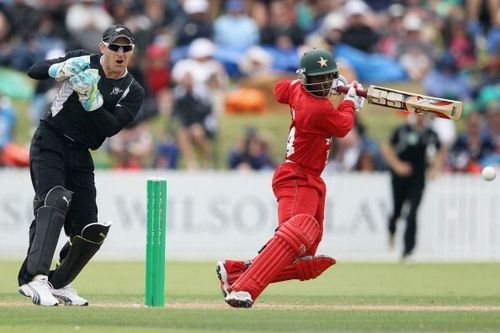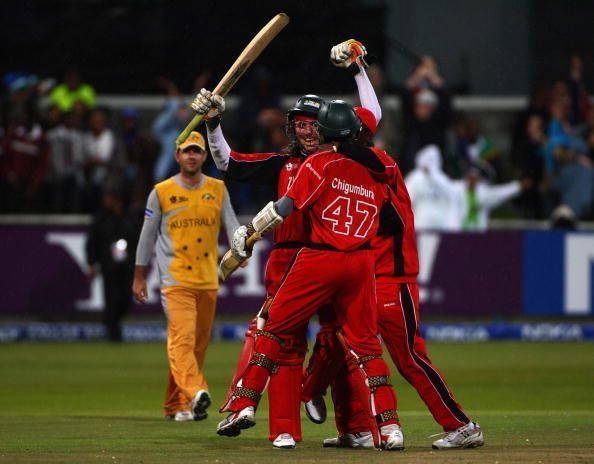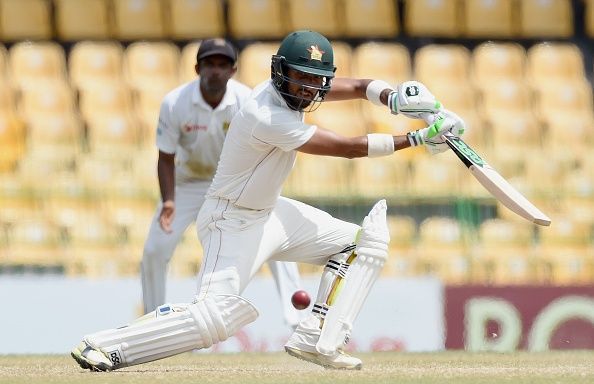
From cricketer to priest to administrator: Tatenda Taibu recalls his incredible journey

Former Zimbabwe captain Tatenda Taibu, who is currently the convenor of selectors for the senior side as well as responsible for overseeing the administration of cricket in the country, spoke to Sportskeeda in an exclusive hour-long chat.
As Zimbabwe warm-up for the upcoming World Cup Qualifiers at home with a bilateral series against Afghanistan in the UAE, Taibu, who retired in 2012 aged only 29, discussed a range of issues: cricketers departing the country to play abroad, upcoming youngsters who excite him and others.
Following are the excerpts from the interview:
First of all, can you take us through Zimbabwe's preparations for the World Cup Qualifiers?
I think our preparations have been quite good because we have played a series of matches in the recent past. With any sport, the best preparation comes from actually playing, and we have done that quite a lot in the last few months: we played Sri Lanka in their own backyard, then hosted West Indies, and just finished with a tri-series in Bangladesh where Sri Lanka were the other team. We have now arrived in the UAE to play Afghanistan.
After this, there are a couple of weeks in which the boys will have a camp ahead of the Qualifiers, so game time has given us good preparation.
So what are the major challenges that you expect to face from West Indies and emerging sides like Afghanistan in the Qualifiers?
One thing which we have got to realise in international cricket is that there will be some good players, one of whom is Afghanistan's Rashid Khan. That is something which is expected from any international cricket team, so what Zimbabwe can do is prepare well and make sure that there are definite plans for each game.
We have got teams [in the same group as Zimbabwe] like Afghanistan, who are from the sub-continent, a western team like Scotland, Hong Kong and another side due to be announced.
So what we have to do is devise plans accordingly.
Following the World T20 in 2016, there was an overhaul of Zimbabwe cricket wherein captain Hamilton Masakadza and coach Dav Whatmore were sacked. What have been the major challenges for you and the current coach Heath Streak? And what have you done to overcome them?
I wasn't really following what was happening when I was away from the game, and the T20 World Cup in 2016 fell during that time period. I didn't really follow what transpired after the tournament either. But when Streak [appointed coach in October 2016] and I got involved [from June 2016], we managed to get Brendan Taylor and Kyle Jarvis back [from county cricket in England].
I can't really say that we have faced a lot of challenges, but the only challenge which I know I have faced – I don't know about Streak – is probably the lack of pace in the structure and the different departments. There is a certain speed at which I expected things to be done but I don't think I have been able to get that.
It might be that having been a professional and played the game at the highest level, thus seeing the game move at a good speed, I might have expected a bit too much. But apart from that, I can't really complain because Streak and I have got things moving in the direction we wanted to.

While the team were in Sri Lanka last year, Streak had expressed concerns about the abandoning of Zimbabwe cricket by Gary Ballance, Tom Curran and Sam Curran in search of more attractive opportunities in England. Does the current crop feel more secure in the present set-up?
The departure of players is not a problem which can be fixed at the international level because that is a High-Performance pathway problem, so it falls under the development program. But yes, we have been losing a lot of players.
As far as the current crop feeling more secure is concerned, we never assure players, because if you assure players, they don't push their limits. There hasn't been a High-Performance pathway that guarantees a safe occupation. So, if you see, there are players graduating from the school level to the Under-19 level, but after Under-19 there hasn't really been anything.
That is why when I came back [as an administrator], I got involved with the academy which would then bring in players from the Under-19 level and form a pool of, say, Under-22 cricketers. That way, there would at least be some sort of a pathway which would prevent players from leaving.
The other thing is that we don't have universities playing cricket at a competitive level, so parents decide that their child should go to a university outside Zimbabwe, to places like South Africa and England, because other countries have universities which play. Also, I believe that the minister for sports in our country must look at how cricket can be brought into universities and colleges so we don't end up losing those players.
Did those reasons make you consider representing South Africa in 2006? Or were the circumstances different during those days?
In 2006, there was definitely a lot that was happening. If you look back at that time, there were political issues and I even got death threats. So I wanted to move away to a different country, preferably to a neighbouring country or an African country. And yes, I did consider moving to South Africa. But that never sufficed.
I retired in 2012 but that was to get a religious background. I asked myself some serious questions about life in general and I thought I should find those answers – and I have since found those answers. My character is such that when I am focused on something, I cannot have any distractions. So I could not focus on two different goals at the same time, and hence, opted to pursue one goal. Since I wanted to find answers to some questions about life, cricket became a distraction.
Going back to your playing days, did you find England's decision to skip the match against Zimbabwe at Harare during the 2003 World Cup reasonable? Or did that decision hurt you?
I think that for some reason, sport is failing to do what we know it can do. Sport can work as a unifying factor, and to see that the situation then, as to what was happening politically, seeing that it could not be fixed by sport was a disappointment for me. There have been so many instances where we have seen sport unifying countries, so that was a bit disappointing for me to see that sport could not play its part to try and solve the mess between the two countries.

Recalling another World Cup, you were a part of the Zimbabwe side that beat Australia in the 2007 World T20. Soon after, you earned an IPL contract from Kolkata Knight Riders for the first season in 2008. What did these two achievements mean to Zimbabwe as a whole and to you personally?
T20 cricket was just being introduced at the time and most of the teams did not know how to approach the format. So we knew rankings would not play a part. Obviously, it was massive for Zimbabwe to have upset Australia, and it was especially nice to have done it at such a big stage like the World Cup.
Talking of the IPL, to be honest, it did not come as a surprise to me because I had been playing well for two years before its advent. If memory serves me right, I had just scored a very nice century against South Africa [in an ODI at Harare in August 2007] and was also carrying good form in the build-up to the IPL.
Although I was short in stature, I remember doing well against India in that period. So personally, it was nice to have received a three-year contract from Kolkata. And obviously, it was a massive experience to have played in India, since you know how big they consider the game to be in the sub-continent.
Do you think the present Zimbabwean cricketers can make it to the IPL?
I think getting an IPL contract is not dependent on only one player, it depends on the whole team. What I mean by this is that if you look at the last ten years, Zimbabwe have hardly played against the likes of Australia, South Africa, India and England. We have played extremely few matches against these top teams, so it has become very difficult to gain the confidence to do well on the global stage.
In fact, we hardly played England, and nowadays, we only have one-off games [Tests] against Australia, India and others.
So unless we start playing better oppositions more regularly and start winning against them, it will be very difficult for our players to get an IPL contract. This is what I think is preventing our players from entering the IPL.
Who among the current or the upcoming crop excites you the most?
Among the group of cricketers currently playing for Zimbabwe, I'd say that Sikandar Raza has been doing really well. Talking about the upcoming crop of players, I am really looking forward to seeing the young wicketkeeper-batsman Ryan Murray [he will turn 20 this March and has already represented Zimbabwe A, Under-19 and Under-17], the near seven-feet tall fast bowler Blessing Muzarabani [he recently took 3/52 against Sri Lanka in the tri-series] and another quick Carl Mumba [he has played 2 Tests and ODIs so far].
According to me, these are very exciting talents and I believe they will do something big for Zimbabwe in the future.